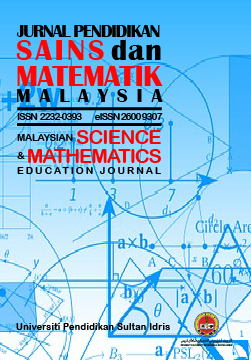The needs and significance to design and develop a Dyscalculia checklist
Keperluan dan kepentingan untuk mereka bentuk dan membangunkan senarai semak Dyscalculia
DOI:
https://doi.org/10.37134/jpsmm.vol10.2.2.2020Keywords:
dyscalculia, checklist, special education, learning disability, mathematicsAbstract
Dyscalculia occupies four to six percent among the population of our pupils. It is as common as dyslexia but it is a learning disability in mathematics instead of reading. However,the dyscalculic pupils are hardly detected and identified due to the lack of awareness and checklist for adults in order to detect them. The purpose of this study is to discuss about the needs and significanceto design and develop a checklist for dyscalculia for dyscalculic pupils. The results show that the needs to develop a dyscalculia checklist are prevalence of dyscalculic pupils, lack of awareness among teachers and parents, and the need of standardized dyscalculia checklist to be officially applied in our country’s education system. If a dyscalculia checklist is being developed, it will bring significance to Ministry of Education, teachers and parents, dyscalculic pupils, and researchers. As a conclusion, the needs to design and develop a checklist for dyscalculia has been identified based on literature reviews. The implication of this paper is that a dyscalculia checklist will be developed by the researchers in order to detect the dyscalculic pupils among the population.
Downloads
References
Alloway, T.P. & Alloway, R.G. (2015). Understanding working memory (2nd ed.). London: SAGE Publications Ltd.
American Psychiatric Association. (2013). Diagnostic and statistical manual of mental disorders (5th ed.). Washington: American Psychiatric Association.
Bakker, M., van den Heuvel-Panhuizen, M. & Robitzsch, A. (2016). Effects of mathematics computer games on special education students’ multiplicative reasoning ability. British Journal of Educational Technology, 47(4), 633-648.
Bird, R. (2017). The dyscalculia toolkit: supporting learning difficulties in maths (3rd ed.).London: SAGE Publications Ltd.
Chin, K.E., Pang, V., Wong, K.K., Tan, C.K. & Lee, K.W. (2014). A preliminary study for dyscalculia in Sabah, Malaysia. The Eurasia Proceedings of Educational & Social Sciences (EPESS), 1, 217-225.
Musa, F.C.& Ahmad, N.A. (2019). Conceptual framework of teacher’s competence in teaching and learning of fine motor skills to students with special education needs (learning disabilities). International Journal of Academic Research in Business & Social Sciences, 9(11), 1180-1186.
Ashraf, F.& Najam, N. (2014). Validation of Learning Disabilities Checklist in PublicSector Schools of Pakistan. Pakistan Journal of Psychological Research, 29(2), 223-244.
Ferraz, F. & Never, J. (2015). A brief look into dyscalculia and supportive tools. The 5th IEEE International Conference on E-Health and Bioengineering, 15-18.
Fu, S.H. & Chin, K.E. (2017). An online survey research regarding awareness of dyscalculia among educators in Sandakan district, Sabah. International Journal of Academic Research in Progressive Education and Development, 6(2), 1-10.
Jamian, R. & Taha, H. (2020). Needs analysis of mobile application usability specifications for mathematics year 4: constructs of attitude, interest and basic knowledge. Jurnal Pendidikan Sains & Matematik Malaysia, 10(1), 9-15.
Joshi, N. & Vanaja, C. (2016). Checklist to screen children with reading difficulty for classroom teachers. Language in India, 16(1), 185-199.
Hornby, G. & Evans, W.H. (2013). Including students with significant social, emotional and behavioural difficulties in mainstream school settings. In P. Garner, J. Kauffman & Elliot, J. (Eds.). The SAGE Handbook of Emotional & Behavioral Difficulties (2nd ed.). London: SAGE.
Knudsen, G.S. (2016). Identifying dyscalculia symptoms related to magnocellular reasoning using smartphones (Master Thesis). Norway: University of Bergen.
Ministry of Education Malaysia. (2011). Instrumen senarai semak disleksia. Retrieved on 7th May 2020 from
Ministry of Education Malaysia. (2013). Malaysia education blueprint 2013-2025 (preschool to post-secondary education). Putrajaya: Kementerian Pendidikan Malaysia.
Morsanyi, K., McCormack, T. & O’Mahony, E. (2017). The link between deductive reasoning and mathematics. Thinking & Reasoning, 24(2), 234-257.
Moser, I., Vibert, D., Marco, D. & Mast, F.W. (2017). Impaired math achievement in patients with acute vestibular neuritis. Neuropsychologia, 107, 1-8.
Nor Elleeiana Mohd Syah, Nur Azah Hamzaid, Belinda Pingguan Murphy & Lim, E. (2016). Development of computer play pedagogy intervention for children with low conceptual understanding in basic mathematics operation using the dyscalculia feature approach. Interactive Learning Environment, 24(7), 1-20.
Seliaman, N. & Dolah, M.U. (2018). Pengajaran matematik sekolah rendah menggunakna pendekatan kontekstual: satu kajian kes. Jurnal Pendidikan Sains dan Matematik Malaysia, 8(2), 27-34.
Sousa, P., Dias, P.C. & Cadime, I. (2016). Predictors of primary school teachers’ knowledge about developmental dyscalculia. European Journal of Special Needs Education, 2(1), 3-10.
Wong, K.K. (2016). The development of an early dyscalculia test (Doctoral’s thesis). Universiti Malaysia Sabah, Kota Kinabalu, Malaysia.
Yusta, N., Karugu, G., Muthee, J. & Tekle, T. (2016). Impact of Instructional Resources on Mathematics Performance of Learners with Dyscalculia in Integrated Primary Schools, Arusha City, Tanzania. Journal of Education and Practice, 7(3), 12-18.
Yoong, Y.S. & Ahmad, N.A. (2018). A conceptual framework for DoCtor WoRM’s Module in improving multiplication skills among year four low achievers. International Journal of Academic Research in Business and Social Sciences, 8(4), 946-957.
Yoong, Y.S. & Ahmad, N.A. (2018). Needs analysis of DoCtor WoRM’s Module in improving multiplication skills among year four low achievers. International Journal of Academic Research in Business and Social Sciences, 8(5), 931-944.
Yoong, S.M. & Ahmad, N.A. (2019). Development and evaluation of DoCtor WoRM’s Module in improving multiplication skills among year four low achievers. SageSubmissions. Preprint.
https://doi.org/10.31124/advance.7609058.v1.
Yoong, S.M. & Ahmad, N.A. (2020). A conceptual framework to design and develop Dyscalculia Checklist Instrument for dyscalculic pupils. Solid State Technology, 63(1s), 495-501.
Yunus, H.& Ahmad, N.A. (2019). A conceptual framework for META ProBaca Module in improving reading comprehension and reading fluency among dyslexia pupils. International Journal of Academic Research in Business & Social Sciences, 9(11), 1187-1200.





